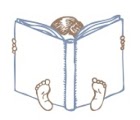This week on our Facebook page we are taking your questions and providing answers here on the blog. This is a great opportunity to let us know if you're wondering, confused, or curious about anything relating to BFB. If you're not on Facebook, feel free to leave additional questions in the comments section below and we'll answer your question later this week in an additional blog entry. Here's some of the questions we've received so far:
From Jessica and Megan: We just came across Beautiful Feet this past school year and my boys and I have loved it! We are almost done with Early American History, my question is this: I'll have a 4th and 1st grader next school year and I'd like to teach California History. I see it's graded for 4th and up...what are your recommendations for my 1st grader since we'll have already completed Early Ameican History. Is he too young to understand and sit in on CA history? Thanks!!
Thank you for your question, and hopefully this will help you also, Megan! The California History study is designed for grade levels 4th-5th. Most of the literature is written at that reading level. That said, we never discourage families from reading above their child's level (remembering that this is a read-aloud program) as this is conducive to expanding comprehension, vocabulary, and listening skills. A number of the books will probably be very enjoyable for your 1st grade student, like Columbus, Island of the Blue Dolphins, Patty Reed's Doll, and By the Great Horn Spoon. The plots in these works is engaging and simple enough to follow for many students that age. Other works in the study may be more difficult. But, then again, you may be surprised at what your younger student can handle! Even if you find his attention straying, don't worry, as you know you'll come back to this study again when he is in 4th grade. Hope that helps. -Rea
From Raven:
I wish there was a supplemental reading list. I have a 2nd grader that loves to read and is reading above grade level. He loves the books in the Early American History curriculum. He managed to read all the books in the curriculum in less then a month. If there are more great suggestions for books (and I know the creators of the great curriculum have some!) I'd love to buy or check them out from my local library!
Thanks for the great question Raven. What a blessing to have such a voracious reader on your hands! As a child I also seemed to inhale all the books set before me. Many of our study guides do include recommendations for additional readings. These guides include Teaching Character Through Literature, Medieval History Through Literature, Geography Through Literature, History of Western Expansion, and Modern US and World History. As you're working through the Early American History for primary grades, we have not really come up with a supplemental reading list for that, but I can definitely recommend some additional titles. Anything by Cheryl Harness is excellent:
Also check out:
The Little House on the Prairie series by Laura Ingalls Wilder
At your library look for titles by Jean Fritz and Marguerite DeAngeli, both wonderful authors with great stories of American history.
On another note, in my experience as a voracious and fast reader, I have had to make a conscious effort to slow down my reading in order to insure that I get as much as possible out of what I am reading. Your son may not have this problem at all, but it may be something you want to keep an eye on. Many young readers (and I include myself in this), are able to read very quickly but miss out a bit on the details of what they're reading. Teaching these students to slow down and keep pace with a curriculum that has comprehension questions is a good way of insuring that they're not only reading quickly and efficiently, but reading thoroughly. Supplementing the study with the books above will allow your student the pleasure of reading the extra books quickly, while presenting his with the challenge of slowing down for the core books. Re-reading books is also a great way to encourage more engaged reading. Again, your son may be able to read quickly and thoroughly for his age and this may not apply. I hope this answers your question. I think that a supplemental reading list for all our curriculums is a great idea and will get working on putting that together!
From Heather:
Can a family with a child in 6th grade beef up the Early American Guide to use with said child's 9th grade sibling? Or would it be best to stick with the American/World Guide for the older sibling?
Great question Heather! The Early American History study guide for intermediate grades is aimed at students in 5th-6th grade, obviously perfect for your 6th grader. For a 9th grader it will be important to heavily supplement the course, or have the older student work through the Early American and World History study for 7-9th grade. The most straightforward approach would probably be to have your 9th grader work through the program that is designed his level, especially as he is now in high school and you want to ensure that he receives proper credit and can put the course down on his transcripts as a high school level course in the event that he applies to college. If you wanted to combine the courses for your children, I would lean more heavily on the advanced course in order to insure that your older student is challenged and working at grade level. If you wanted to do the Early American and World History course as a read-aloud with both your students, I think that the younger student would probably get a lot out of it. You could use the comprehension questions as discussion topics to engage both students in the material. In order to insure that the 6th grader has grade-appropriate assignments, you could supplement it with the Early American History intermediate study guide and have your 6th grader pick out some titles from that program he or she wanted to read through on his own. Alternatively, if you want to keep it simple you can have each student work through their own program but encourage them to discuss what they're learning with one another. I hope this helps.
Those are the questions we've received so far! Please leave any additional inquiries in the comments section below or on our Facebook page. Also let us know if you have any follow-up questions to the answers provided above! Thanks and we look forward to hearing from you!
RELATED ENTRIES:
































